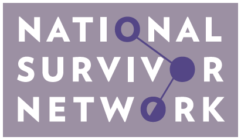February 15, 2022 | Category: Values Orientation
The National Survivor Network is a values-based membership and professional network for survivors of human trafficking engaged in or preparing for leadership in the anti-trafficking movement. We do not provide crisis services, and are not a crisis response organization. Our aim is to develop, equip, and empower a community of survivors of human trafficking engaging in advocacy, education, peer-to-peer mentorship, prevention, and policy work using a public health framework and human rights approach.
How do you define “survivor of human trafficking”?
The NSN uses the operational, criminal definition of severe forms of trafficking found in the TRAFFICKING VICTIMS PROTECTION ACT OF 2000. “Severe forms of human trafficking” in the law refers to the crime of trafficking involving force, fraud, or third-party coercion or the exploitation of a minor in commercial sex and does not include consensual sex work in any form. We welcome and prioritize survivors who have experienced human trafficking in any form of labor, and do not conflate trafficking and consensual commercial sex in our values or our membership criteria. Anyone who has experienced trafficking according to this definition is welcome to apply for membership, whether they personally identify with or resonate with the label “survivor of human trafficking” or not.
Do you prioritize survivors of trafficking in some forms of labor over others?
The NSN acknowledges that all human trafficking exploits an individual’s body and mind, and that trafficking in the sex trades is not inherently more traumatic, grievous, or important to address than trafficking in other forms of labor, as different experiences of trauma cannot be compared or measured. Financial abuse, wage theft, physical violence, debt bondage, and psychological trauma are not inherently less traumatic than sexual violence. Additionally, the division between sex trafficking and labor trafficking relies on an assumption that is not shared by all survivors (that commercial sex is not labor), and that disregards the ways in which sexual violence is a common component of all kinds of human trafficking. We believe that “fraud” in human trafficking should not be treated differently based on the form of labor it occurs in.
Throughout the anti-trafficking movement, dialogue, policy work, and survivor supports are dominated by survivors of trafficking in the sex trades. This is strongly influenced by the early movement’s emphasis on sex trafficking as a uniquely horrific form of violence, as Chris Smith’s bill in 1999 was the “Freedom from Sexual Trafficking Act of 1999.” In explaining why it was urgent to address trafficking within commercial sex before other forms of labor, he explained we should address “the most brutal form of trafficking” first. He acknowledged that his bill “is far tougher on the criminals and far more generous to victims than would be appropriate if we were trying to legislate about working conditions in legitimate industries,” wildly disregarding the inhumanity and brutality of forced labor and entirely disregarding the rampant use of sexual violence within trafficking in “legitimate industries.” This framing of trafficking in the sex trades as inherently more brutal than other forms of labor is directly related to the history of anti-trafficking strategies being used to restrict immigration, stir up a “white slave panic,” and promote racism. It also disregards the brutal history of chattel slavery in the United States, and the horrific conditions of forced labor.
The NSN acknowledges that labor trafficking is underreported due to this increased emphasis on trafficking in the sex trades in awareness and prevention campaigns as well as media coverage and service provision. We strive to maintain inclusive messaging and spaces in which labor trafficking survivors feel seen and have their wisdom and lived experiences valued, and we advocate for campaigns and services to end trafficking in all forms of labor. Throughout the anti-trafficking movement, survivor spaces cater to the unique needs of survivors of commercial sex trafficking, and often at the expense of visibility and care for survivors of other forms of labor trafficking. We intentionally strive for balance and inclusion to correct that overemphasis. All human trafficking is abhorrent; all people deserve safety and bodily autonomy.
Do you prioritize certain kinds of survivors over others?
The NSN advocates for disabled people, transgender and queer individuals, noncitizens, Black, Indigenous, and other People of Color (BIPOC), people with HIV/AIDS, current or formerly incarcerated people, and frequently criminalized communities to be protected through safer working conditions, free from discrimination, harassment, violence, wage theft, fraud, exploitation, and human trafficking. We oppose conflation of consensual and trafficked engagement in sex trades and acknowledges that not all adults in the sex trades are trafficked. Conflation of consensual labor and trafficked sex leads to increased surveillance, criminalization, and incarceration of people from marginalized communities, criminalizes harm reduction and safety practices that people in the sex trades use to keep each other safe, and leads to decreased engagement from direct services and healthcare staff when they are confused about what trafficking is. It also erases the experiences and agency of survivors who have both trafficked and consensual experiences in the sex trades and prevents those survivors from feeling included in anti-trafficking spaces.
…..
Read the second in our orientation series to our new values statement, “How NSN communicates and navigates groups” and view our full values statement here.
